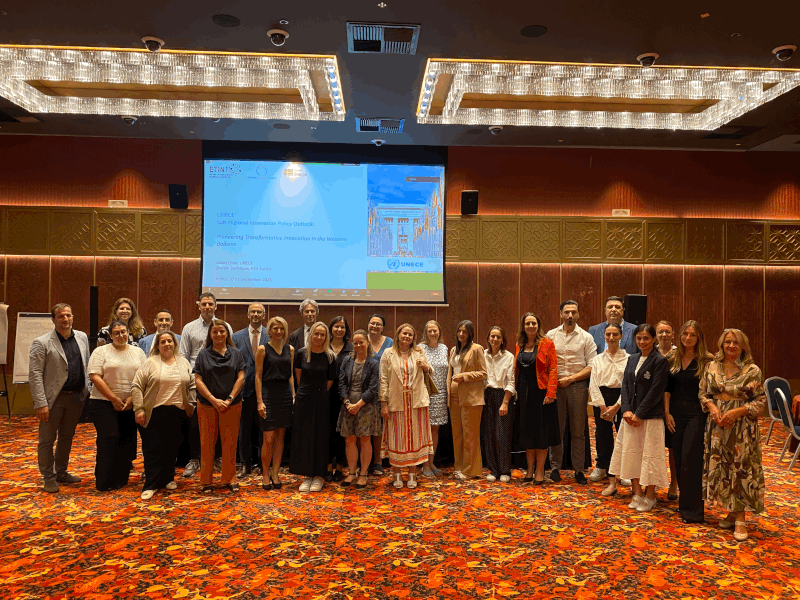Role of Transformative Innovation in supporting the Green and Digital Transition

Innovation practitioners discussed the role of transformative innovation in supporting the Green and Digital Transition of the Western Balkans.
The Regional Cooperation Council and United Nations Economic Commission for Europe (UNECE) organised a joint technical meeting on 20-21 September 2023 in Przno (Montenegro).
The meeting's first day was dedicated to introduction to transformative innovation and good practices from around the world.
The second day’s workshop facilitated by the RCC proved to be a valuable exchange of opinions and ideas among innovation practitioners from the Western Balkans.
Transformative innovation matters because it can reshape the overall societal structure and boost people's quality of life. It can help less developed economies boost their competitiveness and economic growth.
Day 1 Overview: Fostering Transformational Innovation with UNECE
On the meeting's first day we delved into the world of transformational innovation (TI) through four enlightening sessions.
Session I focused on the UNECE's innovative approach to promoting TI. UNECE specializes in science, technology, and innovation (STI) policy, with a keen interest in the Western Balkans.
Their mission involves strengthening innovation policy governance and translating innovation inputs into concrete outcomes.
Session II explored the significance of TI in historical, present, and future contexts. Key insights revealed that TI is a gradual accumulation of innovation elements, with no single definition. In the context of the Western Balkans, TI aims to drive systemic and societal change, addressing SDGs, green and digital transitions, and the planetary crisis.
Session III addressed the implications of TI for governance and policy. While governments play a crucial role, they must adapt and rethink their strategies. Political leadership and information sharing are vital tools to foster TI-friendly mindsets.
Session IV emphasized measuring the impact of innovation governance and proposed key principles, including supporting new activities, catalytic support, data-driven decisions, embracing failures as learning opportunities, and fostering innovation within policies and institutions.
What is ETIN?
The UNECE Transformative Innovation Network (ETIN) is a strategic platform and meeting place for peer learning, collaboration and a joint exploration of policies and practices.
it aims to assist involved stakeholders in promoting innovative processes toward boosting competitiveness and accelerating a sustainable transformation of societies in the UNECE region. The Western Balkans will be one of the ETIN's foci in the forthcoming years.
The ETIN's activities in the region will facilitate evidence-based insight on critical aspects of transformative innovation, structured foresight on relevant trends affecting a future deployment. It will assist in consultation among peers, extended collaboration between interested parties, and specific processes for exploration of policies and measures supporting transformative innovation.
Day 2: Innovation key areas of action in the Western Balkans
The region's innovation champions identified key areas of action for the future while being cognizant of typical challenges and opportunities.
The most important challenges the regional innovation systems are facing include political and economic instability, rule of law weaknesses, corruption, poorly designed policies, insufficient political commitment, worrying brain drain, and limited access to finance.
A separate obstacle is the limited understanding of the concept of transformative innovation.
On the other hand, many opportunities have been identified.
Some examples include the enormous human capital of the region’s large diaspora which could be geared toward knowledge transfer.
It has been emphasised that the region’s pool of creative talents is untapped potential.
In addition, geopolitical location or proximity to key markets, mainly the EU member states is seen as an opportunity for broader regional collaboration and joint initiatives.
Innovation could become a driving force for the region’s speedier economic growth if recognised by key stakeholders, partly by promoting success stories.
The plenary session helped us to identify three key points to have in mind for future actions.
First, to make things happen the ETIN should a focus on topics relevant to the Western Balkans.
All practitioners from the region are eager to participate and contribute, as long as there are tangible benefits for their respective organisations and communities.
There should be an understanding that theoretical concepts in the Western Balkans, valuable in themselves, are not as attractive as hands-on activities, even if modest. Some of these topics might be smart specialisation priorities or elements of green and digital transitions.
Second, the region should find a way to identify and empower key institutional drivers.
The focus should be on brokers capable of supporting bright minds to innovate, commercialise their creative ideas and promote healthy doses of competitiveness.
Finally, the ETIN should listen carefully to the real needs on the ground to design measures/actions with the potential of making a difference.
The first practical steps could include smaller pilot actions which could act as transformative innovation test beds. The more we focus on solving practical problems, the easier it will be to recruit supporters in the future.
Next steps
The next steps involve two interlinked actions.
First, follow-up with another regional meeting in early 2024. The next meeting should focus on the three key areas of action as mentioned above.
Second, leverage on the UNECE flagship publication, the ‘Sub-regional Innovation Policy Outlook (IPO). The IPO assesses the scope and quality of innovation policies, institutions, and processes across several economies of the same geographic region.
Its ultimate goal is to enhance economies’ productivity, competitiveness and sustainable development, while serving to enlarge the evidence base for mutual policy learning.
